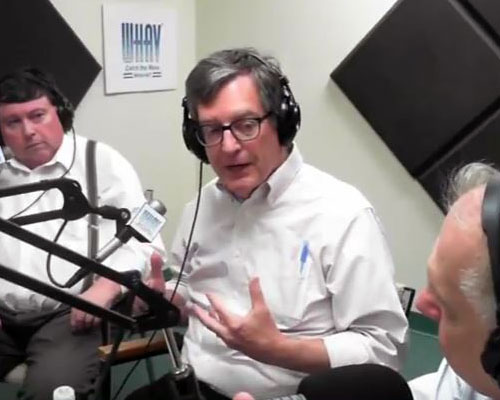
Author Dan Kennedy, center, with WHAV’s New Open Mic Show hosts Bill Ellis, left, and Bill Macek, right. Complete video below.
The future of newspapers is largely online, according to Dan Kennedy, author of a new book, “The Return of the Moguls: How Jeff Bezos and John Henry Are Remaking Newspapers for the Twenty-First Century.”
Appearing during the second hour on WHAV’s New Open Mic Show Monday night with co-hosts Bill Macek and Bill Ellis, Kennedy explained revenue from subscribers and not digital advertising may well be the elusive formula for success.
Asked by co-host Ellis to predict when print newspapers will disappear, Kennedy responded, “If you asked me 12 years ago, I would have said print newspapers would be gone by now and they’re still very much with us. And, they’re still more lucrative than digital. So, I think print newspapers will be around as long as people are willing to pay a premium for that experience.”
Kennedy said the idea for his new book—his third—came together in one weekend in 2013. That’s when Red Sox owner John Henry announced he was going to buy the Boston Globe. Three days later, Amazon owner Jeff Bezos agreed to acquire the Washington Post. Kennedy said the 2012 purchase of the Orange County Register newspaper by former greeting-card executive Aaron Kushner confirmed the trend. Kennedy explained the three events reinforced the idea that free news on the web wasn’t going to work.
Henry paid $70 million for The Globe—a fraction of the $1.1 billion the New York Times paid in 1993. Bezos bought the Washington Post for $250 million.
The millionaire owners had deep pockets in common—necessary to slow the bloodletting—but each tried a different tact. Bezos has moved the Washington Post’s focus from regional to national, while “The Globe has bet the farm on digital,” Kennedy said. The Boston paper has pushed digital subscriptions to almost 100,000 and is aiming for 200,000. If successful, the model will shift the bulk of the paper’s revenue base from advertisers to readers.
The Washington Post has invested heavily in digital apps, hoping to lure national paying subscribers instead of relying on the Washington, D.C., market alone. On the other hand, Kushner’s ideas for bolstering printed pages appears to have failed.
Asked by Macek if newspaper readers will remain older, Kennedy noted, “There are signs young people are more willing to pay for the news. They’ve become accustomed to paying for things.” He cited Netflix, Spotify and Apple Music as examples. However, they won’t buy ink on paper. “Young people tend to get the news pretty exclusively from their phone.”
Kennedy saved his final remarks for WHAV’s on-air and online efforts. “I’ve been up here to WHAV before. Local independent media and journalism are so important and I just continue to be impressed by what you all do up here.”
Kennedy is an associate professor of journalism at Northeastern University and a nationally known media commentator. A panelist on WGBH-TV’s “Beat the Press,” he writes on the news media for WGBHNews.org and other publications. He previously wrote a media column for The Guardian and, before that, for The Boston Phoenix. His website, Media Nation, can be found at dankennedy.net.
The New Open Mic Show is heard live, every Monday night, from 6 to 8 p.m., on 97.9 WHAV FM. Video of the program is also available at WHAV.TV, WHAV’s Facebook page and HC Media Channel 22.
